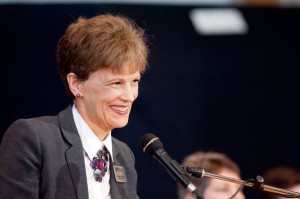http://www.thesheaf.com/news/2011/08/31/elected-u-of-s-senators-take-on-board-chair/
by Daryl Hofmann on August 31, 2011 in News
 Nancy Hopkins speaks at the Board of Governors meeting at the University of Saskatchewan on Friday, March 4, 2011.
Nancy Hopkins speaks at the Board of Governors meeting at the University of Saskatchewan on Friday, March 4, 2011.
A small group of University of Saskatchewan senators are troubled by the growing influence of corporations on campus and want the chair of the Board of Governors to resign.
The senators argue that Nancy Hopkins’ role as chair of the U of S Board of Governors generates a conflict of interest due to her longstanding involvement with uranium mining giant Cameco Corp.
Hopkins has been a prominent player in Cameco’s boardroom since 1992. According to Forbes Magazine, Hopkins received roughly $175,000 in compensation for work as a Cameco director in 2009, and as of this year, her estimated stake in the company is just over $1 million.
In April, lawyer and elected U of S senator Stefania Fortugno wrote to the university’s top brass detailing Hopkins’ apparent conflict of interest.
Fortugno cited Hopkins’ pecuniary interests with Cameco, the appointments of high-ranking nuclear physicists and the naming of the Cameco Skywalk at Royal University Hospital, and Cameco Plaza in front of the Administration Building.
Further, she points to the allocation of $30 million for a nuclear research centre while language programs are cut and the sociology department is underfunded, leaving some students unable to graduate on schedule.
“The Board of Governors can affect every single aspect of the university’s existence. By virtue of the presence of a Cameco Board member on the Board of Governors, the nuclear industry has undue influence over every aspect and key decision affecting the University of Saskatchewan,” the letter read.
As the U of S ramps up its focus on nuclear research, Fortugno would like to see major decisions done by an objective board, rather than individuals who are tied to industry.
Fortugno ended the letter by calling on Hopkins to step down.
Another elected U of S senator, Mary Jean Hande, has also voiced concerns about Hopkins’ perceived conflict of interest. Above all, Hande was outraged that Hopkins is head of the committee designated to select the next U of S president.
“I was actually completely shocked when I found out about this at one of the senate meetings, and I was shocked that nothing was being done,” said Hande. “It was quite an eye-opener, especially as somebody who is fairly new to the senate. I felt compelled to say something.”
With Peter MacKinnon’s tenure as president set to wrap up June 2012, it is rumored that both U of S vice-president of finance and resources Richard Florizone and former Edwards School of Business dean Grant Isaac are two possible successors.
Both are affiliated with the nuclear industry. Florizone holds a PhD in nuclear physics. Isaac is senior vice-president and chief financial officer of Cameco.
Senators Fortugno and Hande insisted that Hopkins should not have influence over the selection of the next president, given her relationship with the nuclear industry and the candidates.
Hopkins has labelled the allegations “absurd,” and assured that no academic appointments or allocations of funds have been affected by her association with Cameco.
She brought up the successful history of nuclear research at the U of S, noting that in the 1960s, the university was at the forefront of nuclear science in Canada with the Saskatchewan Accelerator Lab.
“Saskatchewan is endowed with some of the very best uranium resources in the world. So from the province’s point of view, it is natural to be interested in [funding] that,” said Hopkins.
President Peter MacKinnon is standing behind Hopkins, and says the conflict of interest accusations are groundless and undermine the university.
“If they had the consideration to ask other members of the board or the university administration they would have learned that board chair Hopkins is an outstanding authority on good governance, an excellent board leader and a devoted servant of the best interests of the University of Saskatchewan and all those it serves,” MacKinnon said via email.
U of S Students’ Union president Scott Hitchings, who also sits on the Presidential Selection Committee, referred to the university’s strict conflict of interest policy and said he is confident that if Hopkins were using her role as board chair to advance personal goals, the repercussions would be swift.
“The claim that she, as chair of the Board of Governors, can make the university a patsy of Cameco undermines the powers of the board,” said Hitchings. “She is simply the chair of a board of individuals, all of whom make decisions together for the betterment of the university.”
The senators do, however, feel their campaign is building momentum, and have established a sort of political action committee — University of Saskatchewan Senators Working to Revive Democracy, or USSWORD.
According to their website, USSWORD is deeply concerned about the corporatization of the U of S, and is coming together to try and curb the trend.
Hande stresses the most critical aspect of a university is the independent, publicly-funded research and teaching done there.
“Unfortunately, this distinction between public and private is becoming increasingly blurry at the University of Saskatchewan,” said Hande.